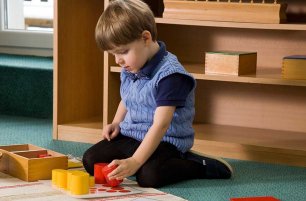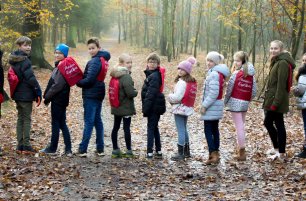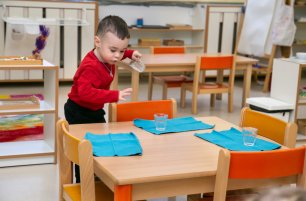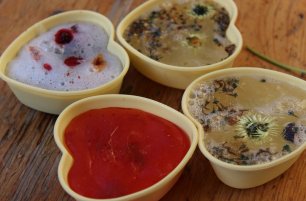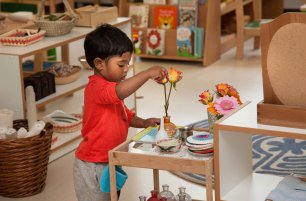“Going Out” and Field Trips
An Essential Element of the Elementary Montessori Student Experience
“When the child goes out, it is the world itself that offers itself to him. Let us take the child out to show him real things instead of making objects which represent ideas and closing them in cupboards.” – Dr. Maria Montessori.
It’s early in the morning, before 8:00, and the Upper Elementary students have already begun to gather in the lobby of IMSP with backpacks, sleeping bags, and paperback books. Today we are “going out” for a three-day overnight field trip to rural Czechia, where the students will experience the day-to-day life of a working farm. After a month of research and organization, they are finally ready for the experience of the farm itself, where they will get their hands dirty and, for a few days at least, live the life of a working “farm hand.”

This field trip, like many of the monthly “going out” trips we take in Elementary, has been carefully planned by the students with teacher guidance. On a multi-day field trip like this one, schedules must be created, jobs must be assigned, meal plans must be devised and food ordered, transportation must be secured, and even sleeping accommodations need to be considered and planned for.
The students have volunteered as members of teams, and each team has cooperatively worked together to thoughtfully consider every detail. Students needed to work within a budget, negotiate with vendors for delivery of needed supplies, acquire transportation, and catalog clothing and personal needs for the overnight. All of these preparations for the field trip offer the students an opportunity to use and hone many of the skills they have been learning in the classroom but in a concrete, real-world, practical way. And as they plan, they are also sharpening critical thinking, prioritizing, planning, and organizational skills that provide value that goes far beyond the classroom. And that, along with all of the rest of the experience, is the beauty and genius of “going out.”

When Maria Montessori began her revolutionary work with children, she included the concept of offering children the experience of leaving the classroom during the school day to explore topics they have been introduced to, but by going out into the world, to offer them in a more realistic, concrete way. She imagined elementary-aged children, fired-up and excited by their curiosity, bursting with questions, and thirsting for a deeper understanding and experience with the subject they were inspired by. Dr. Montessori conceived the idea of “going out” as a student-driven and organized activity, encouraged and guided by teachers, but for the experiential enhancement of the students.

The practice of going out offers the students the opportunity to not only experience real-world circumstances, but it gives them the chance to practice many of the skills they are learning in the classroom, such as grace and courtesy, organization and planning, responsible social interactions, cooperation, and resilience. They learn in the process how to overcome difficulties by agreeing on the goals they want to achieve, and then working together to meet those goals.
As they research, they may find that they need to adjust plans, rethink assumptions, and negotiate with others to make their plans work. They need to make decisions that take into account the needs of everyone involved, including their teachers and other adults who are involved. They need to consider details and make sure that every realistic contingency that they can imagine has been considered. This is a very empowering process, where students learn how to work through problems and find solutions. In the process, they learn a lot about themselves as well.

Of course, as part of our mission in the Elementary, the students have a chance to go out on a field trip each month. In the Lower Elementary, the teachers take the lead as they guide the students through a variety of experiences, from visiting the planetarium as part of their study of astronomy, doing prep work in a commercial kitchen to learn about snacks and foods from around the world, and fossil hunting for evidence of ancient organisms from prehistoric Prague.
These hands-on experiences enhance not only the Montessori Elementary students' understanding of the subject that is the theme of the field trip, but it widens their understanding of how all of these activities fit in the world, and plants seeds of inspiration and curiosity that can lead to lifelong participation. With this kind of experience in learning, as Dr. Montessori wrote;
“Instruction becomes a living thing. Instead of being illustrated, it is brought to life. In a word, the outing is a new key for the intensification of instruction ordinarily given in the school.” --- Dr. Maria Montessori.

This interconnectedness that the students experience is an invaluable element in the Montessori cosmic curriculum, which is designed to offer each student, as much as possible, a holistic whole-world view. While the work and learning the children do in the classroom is essential, the experiences they have on field trips nurture their curiosity and often inspire deeper understanding and a desire to learn even more. The hands-on experience of hammering rocks while looking for fossils, or rolling dough to make pastries, or mucking out stalls and feeding cows and chickens, can’t be replicated by three-part cards and research. All of these activities offer the child an opportunity for “deep learning,” – experiential learning that touches them not just intellectually but physically and spiritually.

One of Maria Montessori’s most famous sayings is, “The child learns through the hands.” What better way than for children to learn than to discover the texture and smell of the lanolin in sheep's wool, the crevices and roughness of a newly discovered (by them) trilobite fossil, or the gratefulness of a calf that they have fed as it nuzzles against them as they stand by the corral? These are precious experiences for every child, ones that help them see things in a new way, and sometimes, positively enhance the way they see our world completely.
By Joyce McCusker and Greg McCracken
Want to learn more? Read our next article:
